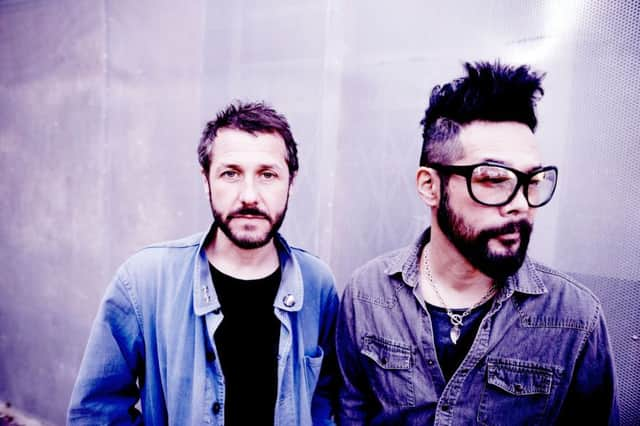Feeder: ‘It’s all about the songs at the end of the day’


After a brief hiatus in the middle of the decade, when singer and guitarist Grant Nicholas and bass player Taka Hirose dallied with side projects, rock band Feeder have been on a hot streak these past few years.
Since 2016 they’ve released two albums that have made the top 10 in the UK – All Bright Electric and a Best Of that came with a bonus disc, called Arrows, comprised of entirely new material. Now comes Talulah, arguably their strongest set of songs since Comfort in Sound, their landmark record that sold more than half a million copies in 2002.
Advertisement
Hide AdAdvertisement
Hide AdFifty-one-year-old Nicholas says he started writing new songs “towards the end” of touring duties for the Best Of. “While we were doing festivals I was writing a few things. Youth was a very simple acoustic track, I wanted a real West Coast classic road trip kind of song, that one came quite early.


“We had a really successful summer, the Best Of did it for us, and I think maybe my head was in a good space and that’s why that some of the album’s come out upbeat.
“It came together over a period of time. I was finishing things off in the tour bus or hotel rooms and when we were sat around waiting for festivals and things like that, but otherwise I would say most of it was written at home.”
Youth’s vibrancy sets the tone for an album brimming with energy. “I tried to make the album a bit like a classic Feeder set in some ways where we come out quite a few big hitters then we go off into more of a rock mode and then we come back to a more anthemic mode.
Advertisement
Hide AdAdvertisement
Hide Ad“It was quite a nice way of approaching an album, a bit like a live set. I thought, ‘This is keeping my interest and I’ve listened to these songs day in day out, that’s a good sign’. There is a small concept in the way some songs are connected – for example Youth is connected with Shapes and Sounds because it’s all about going back to childhood memories, memories of the band on tour, going back to certain areas of South Wales that I think about all the time. It’s all little flashbacks, something just triggers that memory sometimes when you’re writing a song, and a few songs are connected so it gives it a slight concept in some way.
“But the second half of the record opens up into a different sort of vibe. I wanted to start with some classic Feeder indie rock then it goes off into a slightly anthemic place and it ends up on a mellow acoustic song which touches on my solo stuff. It’s a nice journey, I think.”
Advances in musical technology mean London-based Nicholas and Hirose, who lives near Apperley Bridge, often work separately these days. “We don’t do a whole chunk of recording any more,” says the bass player. “Sometimes Grant’s got ideas for three or four songs so he sends me the demos but sometimes he just does the drum track with a drummer. When they do that in a day or two there’s not time for me to put bass on that or anything. If it doesn’t work they move on. I just wait to hear how it comes out. I would have some idea of what I would play but it’s nice to hear the sound of real drums.
“Grant has got his own recording studio at home. When he does the drum recording he has to find a studio somewhere, but after that he can spend time with the engineer working on the guitar or vocal himself, it’s a bit more relaxed. We can do it his way or in a studio, bang, everyone together.”
Advertisement
Hide AdAdvertisement
Hide AdHirose says the pair sometimes discuss the songs beforehand. “It depends. When I play the bass I want to hear the melody. Sometimes Grant only has some melody but he doesn’t have a clear idea of the lyrics yet but when he has he will explain why this sounds like this, sometimes because of a sound he has in his head or he has some lyrics. It works both ways. I like to hear a guide vocal so it gives me some idea to work with.”
The band’s American influences – which include Tom Petty and turn-of-the-90s grunge rock – have, Nicholas feels, “always been there since day one”. “I’ve never been ashamed to mention my influences growing up. Feeder have always been a band that had that mid-Atlantic sound, that’s always been our trademark. It’s a combination of a lot of American artists I’ve listened to over the years and also some great British stuff as well.
“We don’t sound totally like an American band, we don’t sound like a total Britpop band either, it’s somewhere between the two, but that’s the musical area I like. It’s all about the songs at the end of the day. A lot of the bands I’m talking about, whether they’re American or UK, are all very song-based – whether it’s Tom Petty or The Beatles or whatever it is. You have to remember we started in the mid-90s and there was that massive thing going on in America at the time. I think it influenced us because it reminded me of a lot of the stuff I grew up with, the grunge scene to me sounded like pop, heavy metal and punk rock all in one, really – and that’s kind of what we are.”
Hirose likes the uptempo tracks on Talulah, but adds: “I have to say most of my favourite songs on the album are midtempo. It’s a good contrast. When we released Fear of Flying and Youth some people thought they were typical Feeder songs. Yeah, maybe they sound like some of the songs from the old days, but actually these midtempo songs on the album show more about Feeder, the kind of dynamics, a good mixture of heaviness and melody.”
Advertisement
Hide AdAdvertisement
Hide AdThe 52-year-old admits he’d wondered how fans would take to the band after their four-year break, a period he used to work on electronic material and formed Muddy Apes with Feeder’s support guitarist Dean Tidey. “I was wondering what to expect from the fans. As we’re getting older, we have seen the business change. Luckily our fans were waiting for us to come back with a new album.
“Festivals are quite a different matter. When we did that last album we started with smaller festivals. We’ve done them before but with that four-year gap we just started steadily. I wouldn’t say it was getting the confidence back, but it was just about getting more comfortable these last two years. That’s where we should be, performing in front of different kinds of people. Some are like family festivals, some are typical big rock festivals. We can manage any kind of festival because we’ve got history and the songs. I don’t know for Grant, but I got a good feeling back. Four years wasn’t wasted.
“We’ve reached the so-called veteran age. I don’t think I’m that old, but after 20-something years I guess we are. Doing something like Reading and Leeds sometimes we get a slot, but to be honest we don’t really expect that, Ok, leave it to a younger band.”
In the song Fear of Flying Nicholas imagined a female rock star grappling with the social media era. While acknowledging such forums “can do your head in” if you allow them to – “Some people in quite well known bands I know can’t handle all the trolling,” he says, “it can be difficult, I think some people just deal with it better than others” – he recognises it has upsides. “It’s good to let people know about new music. I tend to post a picture of my cat more than anything. It’s a little bit more random and I like that. If you use it correctly you can control it, but once you start getting in depth then I think you get into trouble.”
Advertisement
Hide AdAdvertisement
Hide AdAnother song, Kyoto, looks set to go down well the next time Feeder play in Japan, where they have a loyal following. “It’s a bit random, it just touches on more of a Western understanding of Japanese culture, these little references that I know are pretty obvious to people who know anything about Japan,” Nicholas says. “That was one of the last songs written because I wanted the second half of the album to have more classic, riffy Feeder songs. I listened to a few 70s rock bands to get a few ideas, I suppose that one is probably the closest to anything on All Bright Electric, I would say. Also some of our early stuff is like that, like Polythene. I didn’t want to have too many big riff-rock moments but I felt it needed one and that ticked that box for me. It makes it more of a standout track – in fact in the Japanese version of the album I sing one of the lines in Japanese in the chorus. It’s very subtle but I hopefully that might connect with Japanese people.”
Lonely Hollow Days draws on the folk-pop of Nick Drake. Nicholas says he’s a “huge fan” of the 70s troubadour, whose music has gained much wider appeal since his death in 1974. “On my second solo album, Black Bag, it had got even more finger-picking. I’m hugely into stuff like that, quite a few more acoustic artists, if you call Neil Young acoustic, he’s got a rock side as well, also Simon and Garfunkel, I’ve been into that since I was quite young. There’s something about Nick Drake, he had the most incredible style, the music is amazing. It’s very difficult to play like him because he’s such a great finger-picker. I pick with two fingers, I’ve got an unusual technique, I manage to do it. It’s a style I’ve always loved and it’s often how I play when I write most of the Feeder stuff.”
Twenty-seven years after giving up his studies in graphic design to join Feeder, Hirose feels he and Nicholas are still thoroughly enjoying their musical exploits. “One of the things I don’t want to be is a retired rock musician,” he says. “OK, I’m getting older but every summer there’s a festival, it’s refreshing, let’s do it.
“Sometimes I see so-called veteran bands who are I wouldn’t say sad but just a bit tired. Come on, if you’re on the stage I wouldn’t say you’re a rock star but just a performer, you have to be up. If I go to see a so-called well-known band all I want to see is a good band. It’s not likely they need to wear fancy dress or anything like that, but come on, you’re a musician, you have to look good and show us how good your work is. I want to be myself like that.
Advertisement
Hide AdAdvertisement
Hide Ad“Of course, I’m a rock musician on stage, I want to be funky. I really admire the old funksters like Bootsy Collins or Funkadelic or George Clinton. George Clinton will always be funky until he dies. That’s the life, being a musician. This is our job too. As long as we can continue I want to be like that.”
Talulah is out on August 9. Feeder play at Leeds Beckett University on November 7. feederweb.com